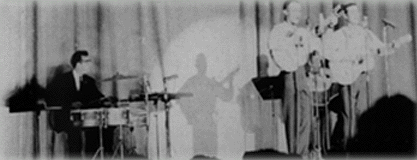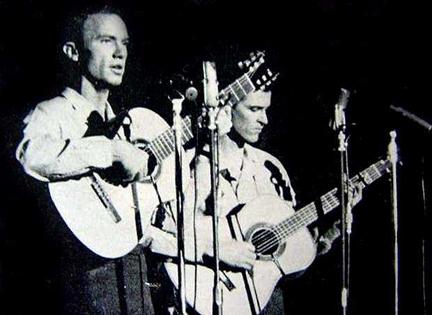Boleros
However, Bud and Travis were and are most known for one musical form above all others: the bolero, a kind of Latin-American folk song. In (somewhat more) recent years, a heavily orchestrated version of this genre was popularized by Linda Rondstadt on her fine Grammy-winning album Canciones De Mi Padre. The Latin-American music on Bud and Travis albums, however, is "stripped down"--two voices, two acoustic classical guitars, a guitarron, and occasionally some light percussion. The results are fabulous. The duo's classical guitar playing is on a par with the finest players in any genre; their singing is achingly passionate, almost operatic; and the overall arrangements are tasteful and never unnecessarily decorative.
Each Bud and Travis studio album contains at least four or five Latin-American songs, and The Bud and Travis Latin Album--the duo's unqualified masterpiece-- is a full collection of Spanish-language material. I cannot recommend this record highly enough. It is Bud and Travis's Sgt. Pepper: a record that both exemplified the talents of the group and set new standards of musical and artistic excellence in folk music. It is, arguably, the finest record to emerge from the late 50s, early 60s folk movement, and certainly a recording that holds its own against any popular album made since.
Studio Albums
Not that the other records are chopped liver. Bud and Travis, the debut, ranks right alongside The Latin Album as a folk masterwork. Of course, the Latin numbers are stunning: "Florecita De Mi Cielo," "Rayito De Luna," "Vamos Al Baile," and the debut of what would become the duo's signature Spanish-language piece, "Malaguena Salerosa." But the breadth of material covered only starts with the boleros. "Bonsoir Dame," a re-worked Haitian folk song, would become a concert favorite; the charming calypso of "She Never Loved Me" rivals anything in the Belafonte catalogue; and Broadway is represented by great versions of "Mariah" and "South Wind." Perhaps the finest song, however, is the Edmonson original, "Truly Do," a gorgeous love song of the sort simply not written anymore. If you're a fan of the television show "Northern Exposure," you have heard this song in the background in two episodes.
Spotlight On Bud and Travis is another excellent album, and perhaps the funnest to sing along to. "Cloudy Summer Afternoon," an Edmonson original and the only Bud and Travis song to crack the American Top 30, debuted on this album. "Wagoner's Lad," another American folk classic, displayed the boys' guitar work at it finest. "Sinner Man," "Poor Boy," and the other American songs on Spotlight give the Kingston Trio a good run for their money. Needless to say, the Spanish numbers on Spotlight--of which there aren't nearly enough--deliver big-time. In fact, "Cielito Lindo Son Juasteco" is arguably the most beautiful serenata in the entire Bud and Travis catalogue.
Perspective On Bud and Travis and Naturally continue to explore Americana: tracks like "Two Brothers," "Abilene," "Joey, Joey," and "Red Clay Country" are as American as songs get, yet they retain that inimitable and somewhat intangible Bud and Travis "flair." Other standouts from these two great records are "Maria Christina," "Sabras Que Te Quiero," and "Tomorrow Is A Long Time" (yes, the Bob Dylan tune!) from Perspective, and "Summertime Love," "Haiti," and "Golden Apples Of The Sun" from Naturally.
Live Albums
The three concert albums are outstanding. They include many essential songs that aren't on the studio records: "Guess I'll Go Home," "La Vaquilla Colorada" and the touching "Carmen Carmella," (among many others) from In Concert; "The Clock" and "Every Night When The Sun Goes In" (among others) from In Concert, Volume 2; and "South Coast," "Amor De Calle," and "How Long Blues" from In Person. Perhaps the most gorgeous "concert-only" song, however, is the shimmering "My Mary" from In Concert, Volume 2. Of course, the previously released material--which often gets revamped but suitable treatment--is quite notable as well. Their between-songs comedy patter is extremely witty and was probably a great influence on The Smothers Brothers.
Of course, I can only talk so much about the music of Bud and Travis. I urge you to look for these records wherever used vinyl is sold, and for the CDs at places like Amazon.com; I guarantee that the music within will speak much more eloquently than I ever could.